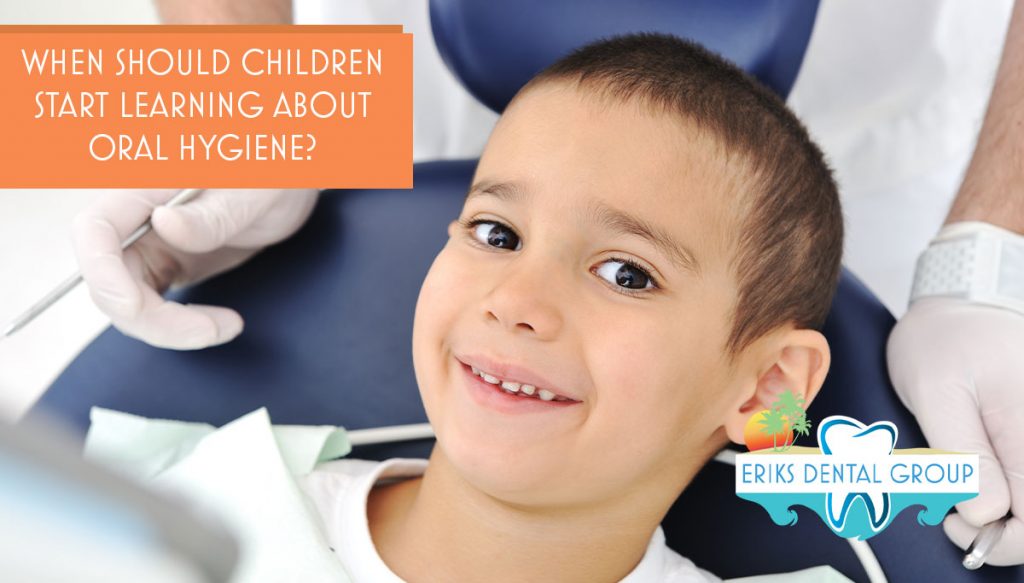As a parent, it can be hard to know when the right time to begin teaching children proper hygiene practices. Impatient toddlers should start learning how to wash their hands, and pre-teens should learn about deodorant.
Oral hygiene can be accidentally overlooked but should begin as soon as a child’s teeth surface.
Children’s Teeth Are At Risk For Decay
As soon as they begin to surface. Oral health impacts overall health, and untreated tooth decay can cause health problems in childhood and later in life. According to the CDC, about 1 in 5 children have at least one cavity.
Children typically have their first set of teeth (primary) by age three. By age six, they may begin to lose teeth and can start getting their permanent teeth.
It’s recommended that oral hygiene practices begin around age three because of the growth changes at that age. As primary teeth begin to surface and children are learning to feed themselves simultaneously, food particles and sugars can cause premature tooth decay.
For older children (aged six and above), losing primary teeth and gaining permanent teeth can create gaps that are perfect hiding spots for bacteria to grow.
For children under age two, it’s recommended that parents consult with a family dentist or pediatrician on the best oral hygiene practices.
Tips For Establishing An Oral Hygiene Routine
The American Dental Association (ADA) recommends that babies should see a dentist before their first birthday. Early visits can help prevent future dental issues and teach a parent how to provide tooth care at home in the coming years.
After that, try to set a good example by allowing children to watch your brushing, flossing, and rinsing routine. This can encourage children at younger ages since they learn by mimicking others.
Young children can have trouble staying focused during the recommended two minutes of toothbrushing. To combat this, bring a stool to the sink so they can sit down while brushing. This can provide a distraction and prevent a toothbrushing meltdown.
Other tips for teaching younger children about oral hygiene include:
- Let children be an active part of oral hygiene by allowing them to choose their toothpaste and toothbrush
- Sing a toothbrushing song to make the routine more fun
- Make a game out of setting a timer for two minutes and encouraging children to brush until the timer goes off
- Schedule regular visits with a dentist
- Reward children with small prizes or activities (like going to the park for three days in a row of brushing for two minutes)
While younger children often carry the bad rap for being difficult to teach and establish an oral hygiene routine, pre-teens and teenagers need these practices too. With all that goes on during the years of puberty, children in the age ranges of 13-17 are less motivated by toothbrushing songs and rewards.
Tips for continuing oral hygiene for older children
- Purchase an electric toothbrush for your teen
- Educate them about the dangers of poor oral hygiene
- Allow them to participate in their dental care by letting them choose flavors of toothpaste and mouthwash
- Schedule regular visits to the dentist
For children of all ages, it can be helpful to let them interact with dental hygiene professionals during their visits to the dentist. It’s common for adults to experience anxiety when visiting the dentist. Establishing a routine and interactively showing children what is involved in a trip to the dentist can help reduce this anxiety in adulthood and set them up for proper tooth care for life.
Schedule An Oral Hygiene Check-up For Your Child Today
As a Boynton Beach family dentistry practice, we are committed to providing dental hygiene for the whole family here at Eriks Dental Group. We’ve got you covered on when children should start learning about oral hygiene and tips to create a routine that sticks. We are committed to providing compassionate dental healthcare for the whole family. We offer routine checkups, cleanings, x-rays, cosmetic dentistry, and more from our Boynton Beach office location.
Our dental professionals look forward to meeting your children and becoming part of your family for years to come.
Give us a call to schedule a checkup today at 561-733-4004

